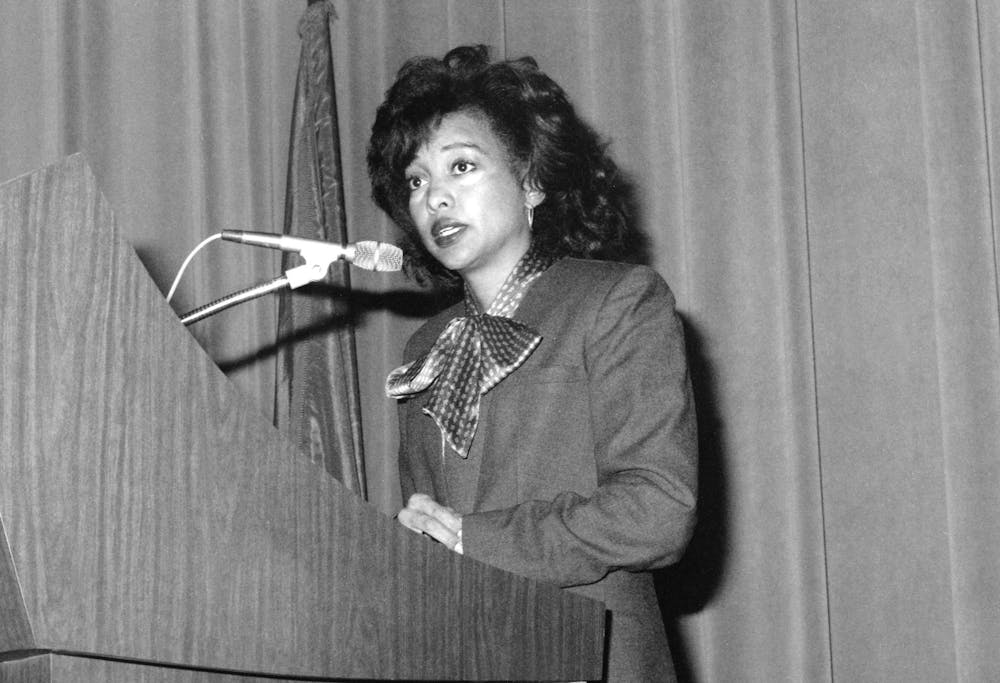Pulitzer Prize-winning commentator Cynthia Tucker had not always planned on journalism. It wasn’t until after struggling with biology and calculus at Auburn University that she exchanged her pre-med plans for a double major in journalism and English.
Tucker knew that a lot of students who worked at The Auburn Plainsman had gone onto journalism careers and thought she should get some college journalism experience under her belt.
“This was 50 years ago,” Tucker said. “There were very, very few Black students at Auburn when I started. I walked into The Plainsman newsroom, and there were no Blacks there.”
Rheta Grimsley Johnson, Editor-in-Chief at the time, welcomed Tucker into the organization. Tucker’s favorite stories to cover were feature stories.
“I do remember one story I did on a young R&B singer who was going to Tuskegee Institute named Lionel Richie, who was just starting his music career with his band The Commodores. I happened to know him because I had a cousin who was dating him at the time, and he gave an interview as his career was starting," Tucker said.
Between her last two years at Auburn, Tucker was an intern with the now defunct newspaper, The Alabama Journal.
“I just fell in love. I thought, ‘This is the best job ever — people are going to pay me to do this?’ I was sold on it as a career," Tucker said.
During Tucker’s senior year, one of her professors helped her land an interview at what is now The Atlanta-Journal Constitution. Once hired, Tucker started out covering stories on school boards and county commissions.
As Tucker began to prove herself as a competent reporter, she was given bigger story assignments. She covered stories in South Africa, Nicaragua, Honduras and Panama.
Most of her career covered politics, producing progressive, liberal commentary for the AJC and her own blog.
“The Atlanta-Journal Constitution was very supportive. I never had to worry about having my columns censored, even when I got negative feedback, the occasional death threat," Tucker said.
When she was starting out, most negative feedback came in the form of a letter. However, as the people’s access to the internet increased, the amount of hate Tucker received did as well.
“A lot of it was racist, a lot of it was sexist, some of it was threatening. People weren’t making any effort to engage in civil disagreement," Tucker said.
The internet's anonymity is what Tucker attributes to people’s loss of civility. As a liberal journalist living in the South, Tucker had to develop a thick skin.
“One uncivil comment encourages another. I also think women get more of that than men do — the incivility to women who have the gall to express their opinions is pretty overwhelming," Tucker said.
While there were undoubtedly times in Tucker’s career where racism and sexism were challenges, there were also instances in which she could use them to her advantage.
“[Earlier in my career] I could walk into a meeting, and if I had not covered this group before, they didn’t imagine I was a reporter. They said things in my presence they would not have said if they had known I was a reporter," Tucker said.
Tucker went on to become a Pulitzer Prize finalist in 2004 and 2006. In 2007, she won the prize for “her courageous, clear-headed columns that evince a strong sense of morality and persuasive knowledge of the community.”
More recently, Tucker was awarded the 2022 Harper Lee Award, an award annually presented to distinguished writers with ties to the state of Alabama. Like Harper Lee, Tucker hails from Monroeville.
Tucker first met Lee in 1984 after Tucker’s father passed away. Lee, a childhood friend of Tucker’s father, came to pay her respects.
After Lee’s initial visit, Tucker’s mother and the "To Kill A Mockingbird" author became friendly, visiting each other occasionally. When Tucker won her Pulitzer, Lee sent a congratulatory letter to tell Tucker how proud of her she was.
Now a journalist-in-residence at the University of South Alabama, Tucker is able to instill in her students the importance of free speech and factual information — both of which, says Tucker, are vital to democracy.
Do you like this story? The Plainsman doesn't accept money from tuition or student fees, and we don't charge a subscription fee. But you can donate to support The Plainsman.
Ella Walton, majoring in English literature with a minor in creative writing, currently serves as the Newsletter Editor at The Auburn Plainsman. Formerly the Culture Editor, Walton has been with The Auburn Plainsman since the fall of 2023.






